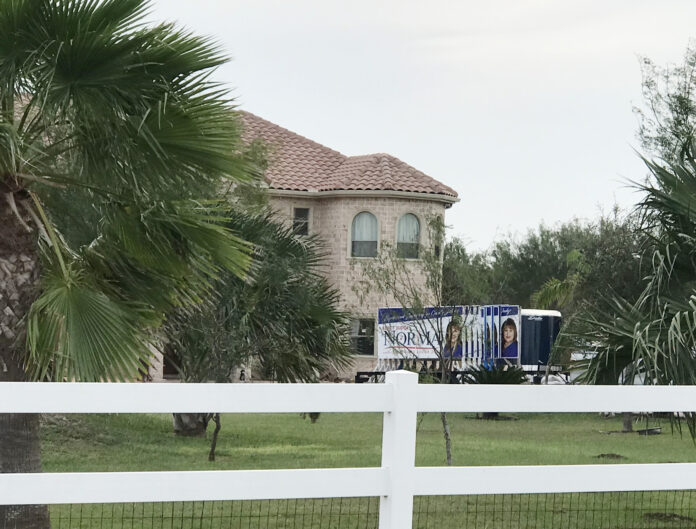
EDINBURG — Hidalgo County Judge Richard Cortez expressed concern Tuesday after the county’s Democratic Party failed to open traditional polling locations in western Hidalgo County, which he argued confused and disenfranchised voters there.
The issue for them was not how many polling locations the Hidalgo County Democratic Party opened on Election Day, but rather where they were placed.
Cortez, who won the Democratic nomination for his post Tuesday night and had no control over the Election Day polling locations, was upset that the only option for voters in the west was a single polling site in Sullivan City.
“I mean, it’s really ridiculous,” he said when reached by phone Tuesday afternoon.
Voters in Peñitas, Palmview, La Joya and Alton — all cities that had one polling location each during the early voting period — were forced to travel to Sullivan City or Mission to cast their votes.
“It’s really very disappointing,” Cortez said.
However, Hidalgo County Democratic Party Chair Patrick Eronini, who as head of the county’s political party was in charge of selecting the polling sites and making sure they were staffed on Election Day, argued that he did what he had to do with little manpower and what he characterized as limited training opportunities for election judges and clerks.
His biggest problem was a lack of qualified election officials, he said.
“So let’s remember also that COVID happened,” he said. “Historically we would man those (polling) locations with retirees. A lot of them died.”
And those who remained had to be retrained to learn how to operate the new voting machines that the Hidalgo County Elections Department was forced to upgrade due to a change in state law. And the county only offered one day of training, Eronini said.
“After the training, about 10 of the (election) judges didn’t feel comfortable. They quit,” he said. “Remember, I have no power to make these people work.”
In order for Eronini to open a polling location, state law requires that there be at least three trained people to manage the site: an election judge and two election clerks.
“Otherwise I can’t open it,” he said.
While he conceded that there were some sites throughout the county that had more than three trained people working Tuesday, he said some of them refused to be moved to other polling locations.
“The one in Sullivan City told me that if I moved her, she was going to quit. So how is that my fault,” he said.
But perhaps most troubling was his claim that people who traditionally man the polling locations in the western part of the county did not want to work on Election Day.
“A lot of them didn’t want to work. The judge in Alton didn’t want to work. The judge in La Joya didn’t want to work,” he said. “…the west was more disproportionately affected because they just didn’t have people working.”
Eronini said he went as far as personally giving a ride to an election worker from San Juan to Mission.
Still, Cortez did not appear to believe that manpower was Eronini’s driving factor.
“We didn’t have problems in early voting,” Cortez said about the county’s elections department, which by law had to run the early voting period — much like Eronini had to run Election Day. “We had the traditional locations open. Now even the traditional locations have been closed.”
Eronini, however, argued that the county refused to share with him the list of election officials it hired to work during early voting.
“They wouldn’t give us that information. They told us it was a privacy issue. So we did the best we could under the circumstances,” he said, adding that he drove from polling location to polling location afterward to try to recruit early voting election workers to volunteer to work on Election Day.
Cortez, however, noted that while there weren’t enough election officials to man sites in western Hidalgo County, there was no shortage of workers in Edinburg and McAllen, where Eronini opened additional polling locations on Election Day.
During the early voting period, the county opened three polling locations in Edinburg and five in McAllen. Eronini more than doubled the sites in Edinburg on Election Day, going from three to eight. And in McAllen he added four more, going from five during early voting to nine on Election Day.
“You can’t tell me that it’s lack of people,” Cortez said. “You chose to put them where you put them.”
He refused to speculate whether Eronini’s decision was a calculated move, but he did note that the Democratic chair favored his opponent in Tuesday’s race: Norma Ramirez, whose campaign signs could be seen outside Eronini’s residence in early December.
“How do you think I feel as a candidate to have the person in charge of this election holding one of my opponent’s signs in one of the (polling) locations,” Cortez said. “And apparently there’s no legal reason for him not to do that, but there must be an ethical and moral reason why he shouldn’t do it.”
Coincidentally, Ramirez held Eronini’s post as chair of the local Democratic Party before she handed the reins to him in order to run for Cortez’s seat.
Eronini roundly rejected the accusation that he placed polling sites in areas where the candidates he supported had a strong sway.
“It has nothing to do with that. I have who I support, you know, but it has nothing to do with that. The decision to close was purely based on manpower,” he said. “So I don’t know how Richard Cortez can read my mind and who I’m supporting and who I’m not supporting, but he needs to focus on doing his job and doing it properly.”



